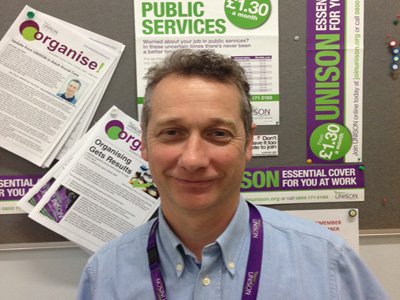
What drew you to adult social work?
I kind of fell into it. My first degree was in geography, which didn’t really lead into anything, and I ended up working with people with learning difficulties on a voluntary basis. There wasn’t a big plan; it was just the lure of people rather than money. My placements on my diploma course, which I finished in 1994 at Edinburgh University, were with adults and so I went into adults.
After qualifying and having a child, my wife and I moved from Scotland to the South East of England, which is where my wife is from. I spent four years at Hampshire council working with people with disabilities before moving to Surrey to do the same kind of work. I made the move on the basis of pay as there was quite a differential at the time, but I was also interested in seeing how another local authority did things.
How did you first get involved with unions?
It was while working with a London health authority in 1985, which was my first real job after my geography degree. They were moving people out of long-term hospital care and beginning that process of bringing people back into the community. The idea was great, but it was so new an idea that the management had not thought about the impact on staffing, with people needing to work late at night at people’s homes. The terms and conditions weren’t great so I thought I needed to join a union and became a steward for the first time.
How did you end up a Unison convenor in Surrey?
I got re-involved three years ago when there was a major restructure and, like most people, I was a Unison member but not really doing much at all within the branch – I would just pay my subs. But this restructure was a big change; loads of money being saved and posts to be deleted.
I thought this is not going to be good and decided to get more active”
Why do you think social workers should join Unison?
The nature of social work is such that you can be the best social worker out there but you are still going to be subject to situations where people may be unhappy with your work or you get a complaint from a care user or an allegation made against you. It goes with the territory and belonging to the union is a kind of insurance. Why should you bother with a union? Can you afford not to?
Unison subs have not gone up for 10 years so it’s as fair as it can be and if you’re in social care you are so vulnerable to change and being expected to do more with less. No matter how hard you try, you are in this very messy system where the risk of things going wrong for you or you getting stressed and going off sick means that the need to have some source of advice is greater now than it has ever been. But things can be done to make the situation better and that happens much easier through the collective voice of a union representative.
People can be reluctant to get actively involved with unions. Why do you think that is?
People think that if they become a steward they are somehow going to get into trouble and be seen as a threat by management. In fact it’s completely the opposite. The corporate view here in Surrey is anything but that; they recognise that if there’s a small issue, for example something that could end up in a disciplinary, we can work together on it before it becomes a big issue.
Why do you think it is good for social workers to become union officials?
I would say there is more social work in a steward’s or convenor’s role than in much of the work people are currently doing where they sit down and process assessments behind a screen. What I’ve found in my three years in this role is that it’s very hard work but the skills you need are very similar to those you need as a social care practitioner.
The skills you need are very similar to those needed in social care”
What misconception of the union would you like to correct?
A lot of members don’t understand that branches are run by a very small number of dedicated people, most of who are operating via time off from their employers. We’re paid our normal salaries and don’t get anything extra. Members sometimes think we’re International Rescue – this large group of people sitting around waiting for a call.




 ‘A kick in the teeth’: DfE axes social work leadership training programme
‘A kick in the teeth’: DfE axes social work leadership training programme 
 Facebook
Facebook X
X LinkedIn
LinkedIn Instagram
Instagram
Comments are closed.